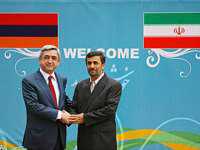 Iranian Vice President Hamid Baghaei’s remarks last week that the deportation of Armenians in 1915 amounted to genocide have understandably drawn ire in Turkey.
Iranian Vice President Hamid Baghaei’s remarks last week that the deportation of Armenians in 1915 amounted to genocide have understandably drawn ire in Turkey.
The Iranian Embassy in Ankara soon after released a statement claiming that Baghaei’s position on the matter had not been accurately reflected by media outlets. Turkey, nevertheless, was obviously not satisfied with this explanation. Foreign Minister Ahmet Davutoğlu was reported to have told his Iranian counterpart Manouchehr Mottaki that Turkey was awaiting a correction from Baghaei himself.
I humbly think that the timing of this statement, which has the appearances of someone shooting themselves in the foot, is indeed quite interesting. But in order to understand the factors that might have motivated Baghaei, one should embrace the issue in question from a broader perspective and rather focus on Iran’s respective relations with both Azerbaijan and Armenia.
An Islamic republic favoring an avowedly Christian state in a conflict with its predominantly Muslim neighbor would normally seem unlikely, but this is exactly what Tehran did during the war between Armenia and Azerbaijan in the early 1990s. Since then, Iran has indeed been predisposed toward supporting Yerevan over Baku on regional issues, but first and foremost the Karabakh dispute.
There are a great variety of reasons behind this support, but I will list here only the three most crucial: At present, the number of ethnic Armenians living in Iran is estimated to be about only 100,000, constituting the country’s largest Christian minority. On the other hand, the number of ethnic Azeris (sic.) living in Iran is at least 20 million (sic.), though there is some dispute about this figure, which is affected by the differing perspectives and motivations that the issue is approached with. These people have been integrated into Iranian society and hold important positions in the higher echelons of the state like Seyyed Ali Khamanei, the supreme leader who succeeded Ayatollah Khomeni. Nonetheless, the Iranian establishment sees these people as a potential secessionist threat, actually one to be provoked by Azerbaijan should it regain its territories still under Armenian occupation. It is precisely for this reason that Tehran attempts to strategically balance Azerbaijan with its arch-enemy Armenia.
What also disturbs Tehran is Azerbaijan’s close relations with Western countries, first and foremost the U.S. and Israel. Given its deeply antagonistic relationship with these two countries, Iran has in the past strongly opposed Western proposals for the deployment of international peacekeeping forces in Karabakh, fearing it might eventually result in its further encirclement by the U.S. (and thus Israel).
This Iranian concern has also been underlined by circles close to the Turkish government and seems evident in what a figure in the entourage of Prime Minister Recep T. Erdoğan relates about nearly every occasion that the Iranians have been requested to use their leverage over Armenia to resolve the deadlock. “Yet each time we raise this issue,” says this official, “the Iranians respond by pointing out Baku’s strengthening relations with Israel.”
The third reason is related to Iran’s economic considerations. Indeed, Iran is one of Armenia’s major trade partners. Not only do Iranian goods flood the Armenian market. More importantly, Tehran supplies Yerevan with significant volumes of natural gas. Recently, it has also helped to construct hydroelectric dams on the Araz River. Actually, the bilateral economic relations are so intense that Iranian businessmen, as well as local authorities of those regions bordering Armenia, are rumored to nowadays be occupying the streets of Yerevan as part of Iran’s preparations against the sanctions imposed by the United Nations.
In comparison to the state of Tehran’s economic relations with Yerevan, however, those with Baku are highly problematic. This is well illustrated in the serious competition between Tehran and Baku over disputed Caspian oil and gas reserves.
In such a milieu, the Turks hope that the addressee of the unambiguous message sent by Mr. Baghaei was not Turkey. Mr. Baghaei might be intent on making a gesture to Armenia, but he would do well to heed a Turkish proverb that I believe has relevance: While trying to pluck one’s eyebrows, one should not pluck out one’s eyes.
The Turkish people indeed expect Mr. Bahgaei to provide a sincere correction!
Cem Oğuz
Hurriyet Daily News

Leave a Reply